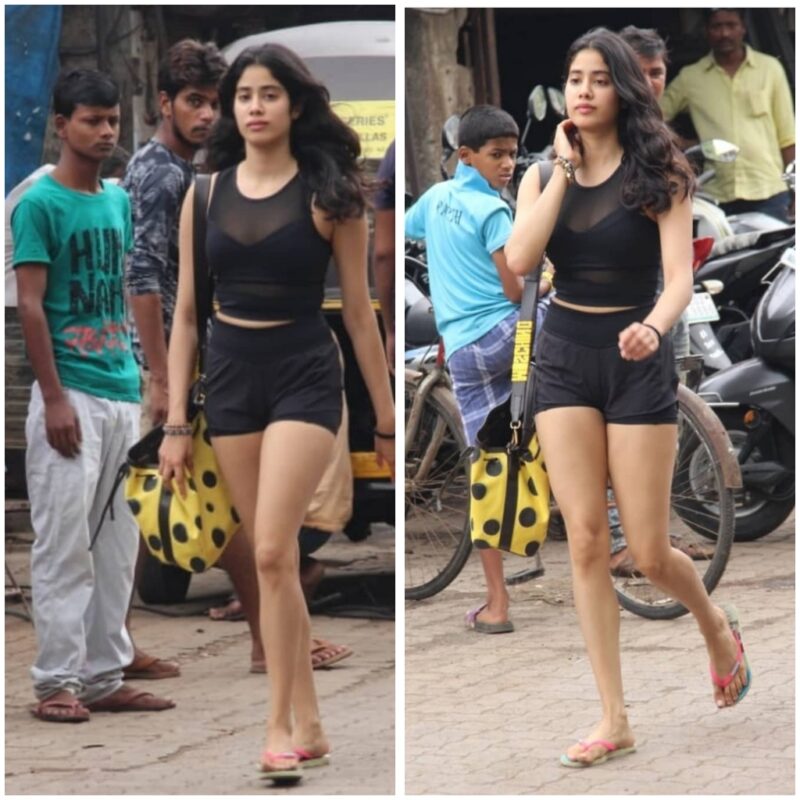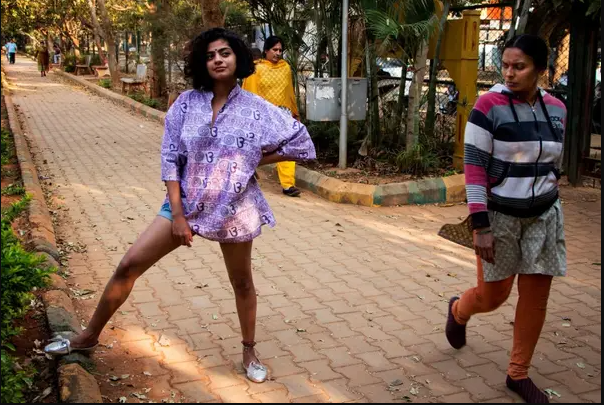It’s 11 am. Vishakha has stepped into the women’s changing room after completing a 60-minute cardio workout at a Kailash Colony gym. She is sweating heavily. “I am not going to take a shower here. It isn’t clean. I’ll go home and take one instead”, she says.
Her home is a 15-minute walk from the gym, but only five minutes by battery rickshaw. With no energy left to walk after the workout, she always boards a battery rickshaw. “Before I board the rickshaw, I ditch my yoga pants. I wear a pair of jeans. It gets really clammy, but it’s okay because gym or yoga pants attract a lot of unwanted attention from men”, she says.
When asked if the Delhi summers don’t bother her, she responds saying it’s better to be safe than to be comfortable. Vishakha adds she will stop going to the gym from mid-April as she isn’t sure she can wear jeans in the extreme summers after a heavy workout.
Several women resort to this tactic where they change into less comfortable clothes – either to escape the male gaze, or to escape the judgements of their ‘not-so-progressive’ family, as one girl Patriot talked to claimed.
Teenagers are always under scrutiny. Ananya, 15, says, “My grandmother monitors my dressing choices. She says stuff like: girls shouldn’t attract attention by wearing sleeveless clothes or shorts, girls should avoid V-neck t-shirts because they show the cleavage. No, they absolutely don’t!” she says with frustration.
She adds that while she isn’t encouraged to wear ripped jeans, she can wear shorts with no fear of judgement if she’s in the company of some family member. Luckily, her mother understands the freedom Ananya craves when it comes to fashion.
Ananya’s mother Sunita recalls similar scenarios playing out two decades ago. “When I was in college, my mother asked us not to wear lipstick and to always use the dupatta to cover our bosom. But once out of the house, we would leave our hair open, apply some lipstick, and use the dupatta like a scarf or just not wear it at all. It was a trend in those days. Everyone did it, else they would call you Behenji”.
Family members don’t only supervise and control what women wear outside the house but also what they wear inside. “My parents are cool with me wearing shorts and halter-neck waist-length tops around the house,” Shreya, a research associate at a Greater Kailash company, says.
“But my mother asks me to not wear shorts when dad’s friends or senior male members of the family are around. I am supposed to wear decent clothing. Shouldn’t my parents be asking these men to look at me as their own daughter and not judge my clothes?”
She points out that most women have seen their brothers wearing vests and boxers around the house, even in the presence of guests. “But they are not asked to change clothes. Only women are. Is it our problem, or the society’s: is a question no one wants to waste time answering”, Shreya says.
Women have adjusted their fashion choices not only to escape the judgemental eye of their family, but also to avoid being ogled, cat-called, or eve-teased. Saumya, an Amazon employee working in the Moolchand area says, “When I’m wearing a sleeveless or a slightly revealing top or dress, I generally wear a hoodie, dupatta, or a long shrug before I leave my house. If I’m wearing a one-piece dress, I will wear jeggings underneath. Then when I reach the destination, I’ll take of these hoodies, jackets and jeggings.”
She only tolerates this time-consuming ordeal because she doesn’t want to be ogled by her neighbours. “It is an average middle class locality. People from different backgrounds live here, and they might object to what I wear. It’s best to avoid the drama than to confront them and teach them a thing or two about fashion and the freedom to choose what to wear.”
Saumya adds that her college friend had worn a white, V-neck, full sleeves, knee-length dress to college once. “She was cat-called in the morning by a group of guys near the college. She was raped in the evening while on her way home by a different group of men. All because of a white dress, a non-threatening fashion choice”, she says.
The heat in Delhi is no joke. The summers are extreme, and the attire one chooses should not be subjected to any judgement. “I cannot bear heat or sweating. I choose to wear loose sleeveless cotton tops while commuting to work. But people in the metro train will stare at you for showing your armpits too. They will keep staring, shamelessly, till they find an answer to the question, ‘How and why is this girl dressing boldly?’ Women will stare at you too”, says Amaan, an advertising agent from Jangpura.

After tolerating a lot of judgemental stares and discomfort, Amaan decided to do something which will cause her more discomfort so that she feels comfortable traveling on public transport. “I wear blazers and a sports jacket. It’s super fun to wear those as I walk for 5-7 minutes from the metro station to my office at 1 pm. My sensitivity to heat doesn’t bother me at all”, she says sarcastically.
Another woman Patriot spoke to, Ashwathy KY, says that when she is going to a club or heading for a night out with friends, she wears a simple kurta while leaving home. “I live in a crowded area. Imagine the reactions if I wear a sheer, revealing club dress and walk through the local market to board my cab”, she says. So, Ashwathy carries her clubbing clothes to a friend’s house from where all the girls leave together for the club or party.
Most men, and often women, don’t even stare at a woman wearing trendy clothing because they want to objectify her. They stare, directly, to understand the freedom and choices the woman has had to feel confident and comfortable in what she is wearing. “And if they do not like the amount of freedom and choices she has, they will judge her out of jealousy. Or they will think she is ‘easy’ and harass her”, says Rashi Jain, a feminist activist.
Every time a woman tries out a new fashion, she hesitates for fear of being judged or harassed. The clothes a woman wears are much more than a fashion choice; they are about her identity and her dignity. The problem doesn’t lie with the fashion, but with the people who use fashion as a tool to control women.
“When a woman is raped, they tend to justify the rapist’s animalistic behaviour saying the victim wore revealing clothes. Why? We ask the women in our family to dress in a certain way so that they don’t end up getting harassed. Why? The onus of helping society to stay respectful should not lie on women and their clothes. It’s about time”, Jain adds.
For more stories that cover the ongoings of Delhi NCR, follow us on:
Instagram: https://www.instagram.com/thepatriot_in/
Twitter: https://twitter.com/Patriot_Delhi
Facebook: https://www.facebook.com/Thepatriotnewsindia





